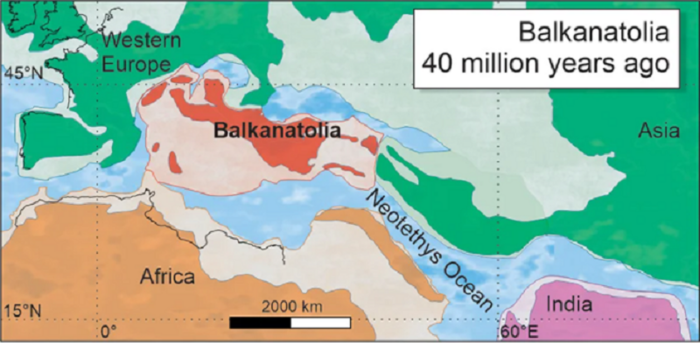The hypothesis that a lost continent, which existed about 40 million years ago and called Balkanatolia, would have acted as a bridge between Asia and south-western Europe when sea levels dropped, allowing several exotic mammals to migrate from one area to another.
The hypothesis is presented by the study published by the French National Center for Scientific Research (Cnrs) in the journal Earth-Science Reviews.
"A very shaky hypothesis, which no geophysicist would approve", commented Fabio Speranza, director of the Rome 2 section of the National Institute of Geophysics and Volcanology (Ingv) for ANSA.
About 34 million years ago, at the end of the Eocene epoch, many animals typical of Western Europe disappeared with the arrival of new mammals from Asia, in a sudden extinction known as the Grande Coupure.
CNRS researchers, led by Alexis Licht, questioned this timeline by re-examining all the fossils discovered in the Balkan Peninsula and Anatolia: their results would indicate that the Balkanatolia archipelago would rejoin the rest of the continent between 40 and 34 million years ago, allowing mammals from the East to colonize new territories between 5 and 10 million years before the Grande Coupure.
"The weak part of the study is that relating to the hypothetical continent", observes Speranza.
"The continents - he continues - are the stable parts of the terrestrial plates. The area discussed in the study is actually the suture zone between Africa and Eurasia, that is the Alpine chain that starts from the Rif chain in Morocco, runs along North Africa crosses Italy from south to north and then continues into the Balkan peninsula and beyond ".
A mobile zone therefore, which, being subject to great changes and evolutions over time, is the opposite of a rigid and non-deformable continent.
"Even putting together the Balkans and Turkey shows little experience in the field of paleogeography", concludes Speranza: "Anatolia is moving towards Greece by about 5 centimeters a year and this movement has lasted for at least 20 million years, so in the era we are talking about was actually much farther east ".



/cloudfront-eu-central-1.images.arcpublishing.com/prisa/UNWPMYUUNNE4BKKNKE4DBQ3BGI.jpg)


/cloudfront-eu-central-1.images.arcpublishing.com/prisa/3JYBYIKF4VE6HFBF74Q3XUM75Q.jpg)

/cloudfront-eu-central-1.images.arcpublishing.com/prisa/DBT2OEOLXBGZTLYKDBM2FWSJNM.jpg)






